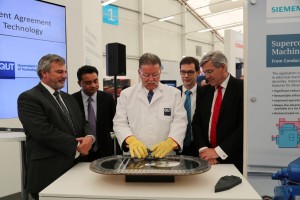Telecommunications equipment manufacturer Siemens has signed a five-year partnership agreement with The Australian Defence Science and Technology Group (DST) and Queensland University of Technology (QUT) to advance the use of high temperature superconducting (HTS) technologies in Australia.

The aim of the joint research is exploring the applications of HTS to Australia’s maritime defence and industrial power requirements, with a special focus on transitioning research to outcomes that can deal with real world problems.
“For the Australian Navy, this partnership opens a pathway to more energy-efficient ships and more effective capacity utilisation. They will also have less environmental impact and will be cheaper to operate,” said Siemens Australia CEO, Jeff Connolly, in a media release to Australian Manufacturing.
“This agreement is in line with our strategic goal to partner with the best talents in industry and academia to achieve a capability edge for defence,” added DST Chief Defence Scientist Dr Alex Zelinksy.
Professor Arun Sharma, deputy Vice-Chancellor Research and Commercialisation at QUT said the university was “uniquely equipped” to undertake such research and development because it has the right expertise and facilities, including the Banyo Pilot Plant Precinct, which is a specialist research centre for structural, mechanical, and electrical engineering.
“Our partnership with Siemens puts QUT at the international forefront of superconducting motor research, an area of research that has the potential to radically transform many industries including maritime propulsion and transport drive systems,” said Professor Sharma.
“As the world strives to find more efficient and cleaner ways to power ships and other forms of large-scale transport, QUT will be testing this superconducting motor and at the same time looking at the other potential uses and benefits of this new technology. QUT’s partnership with Siemens is immensely valuable to us as it enables our university to pioneer research into superconducting motors and generators that can potentially replace diesel propulsion by superconducting derived magnetic fields.”
Siemens said that it has committed an initial investment of around AU$2 million in equipment and resources and AU$0.5 million in research and development hours.
The investment will increase as new research and development projects are initiated under the collaboration.




















